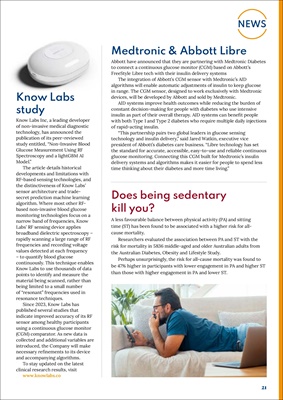
21
NEWS
Does being sedentary
kill you?
A less favourable balance between physical activity (PA) and sitting
time (ST) has been found to be associated with a higher risk for allcause
mortality.
Researchers evaluated the association between PA and ST with the
risk for mortality in 5836 middle-aged and older Australian adults from
the Australian Diabetes, Obesity and Lifestyle Study.
Perhaps unsurprisingly, the risk for all-cause mortality was found to
be 47% higher in participants with lower engagement in PA and higher ST
than those with higher engagement in PA and lower ST.
Medtronic & Abbott Libre
Abbott have announced that they are partnering with Medtronic Diabetes
to connect a continuous glucose monitor (CGM) based on Abbott's
FreeStyle Libre tech with their insulin delivery systems
The integration of Abbott's CGM sensor with Medtronic's AID
algorithms will enable automatic adjustments of insulin to keep glucose
in range. The CGM sensor, designed to work exclusively with Medtronic
devices, will be developed by Abbott and sold by Medtronic.
AID systems improve health outcomes while reducing the burden of
constant decision-making for people with diabetes who use intensive
insulin as part of their overall therapy. AID systems can benefit people
with both Type 1 and Type 2 diabetes who require multiple daily injections
of rapid-acting insulin.
"This partnership pairs two global leaders in glucose sensing
technology and insulin delivery," said Jared Watkin, executive vice
president of Abbott's diabetes care business. "Libre technology has set
the standard for accurate, accessible, easy-to-use and reliable continuous
glucose monitoring. Connecting this CGM built for Medtronic's insulin
delivery systems and algorithms makes it easier for people to spend less
time thinking about their diabetes and more time living."
Know Labs
study
Know Labs Inc, a leading developer
of non-invasive medical diagnostic
technology, has announced the
publication of its peer-reviewed
study entitled, "Non-Invasive Blood
Glucose Measurement Using RF
Spectroscopy and a lightGBM AI
Model."
The article details historical
developments and limitations with
RF-based sensing technologies, and
the distinctiveness of Know Labs'
sensor architecture and tradesecret
prediction machine learning
algorithm. Where most other RFbased
non-invasive blood glucose
monitoring technologies focus on a
narrow band of frequencies, Know
Labs' RF sensing device applies
broadband dielectric spectroscopy -
rapidly scanning a large range of RF
frequencies and recording voltage
values detected at each frequency
- to quantify blood glucose
continuously. This technique enables
Know Labs to use thousands of data
points to identify and measure the
material being scanned, rather than
being limited to a small number
of "resonant" frequencies used in
resonance techniques.
Since 2023, Know Labs has
published several studies that
indicate improved accuracy of its RF
sensor among healthy participants
using a continuous glucose monitor
(CGM) comparator. As new data is
collected and additional variables are
introduced, the Company will make
necessary refinements to its device
and accompanying algorithms.
To stay updated on the latest
clinical research results, visit
www.knowlabs.co/research-anddevelopment.